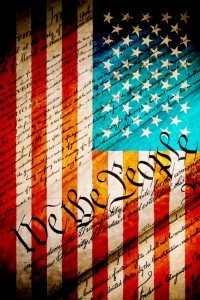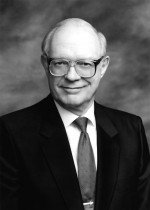 On September 17, 1787, the Constitution of the United States was signed by thirty-nine men who changed the course of history. This year as we celebrate the 225th anniversary of the signing of the Constitution, we reflect on the impact this document has made on societies around the world. I would like to thank these thought leaders, representing a wide variety of perspectives ranging from liberal to conservative, atheist to evangelist, and artist to ambassador, for providing their thoughts on this occasion as we celebrate this document which brings us all together.
On September 17, 1787, the Constitution of the United States was signed by thirty-nine men who changed the course of history. This year as we celebrate the 225th anniversary of the signing of the Constitution, we reflect on the impact this document has made on societies around the world. I would like to thank these thought leaders, representing a wide variety of perspectives ranging from liberal to conservative, atheist to evangelist, and artist to ambassador, for providing their thoughts on this occasion as we celebrate this document which brings us all together.
Michael Peabody, Esq.
Editor
ReligiousLiberty.TV
 [dc]A[/dc]part from those writings considered sacred, the US Constitution (with its amendments) is the most important document ever written. It is especially so for those who are citizens of the United States of America. It outlines many of our fundamental rights, and in doing so, reveals the wisdom of those who wrote it.
[dc]A[/dc]part from those writings considered sacred, the US Constitution (with its amendments) is the most important document ever written. It is especially so for those who are citizens of the United States of America. It outlines many of our fundamental rights, and in doing so, reveals the wisdom of those who wrote it.
That wisdom is a reflection of some of the simple truths found in Scripture. For example, the Bible teaches the principle that the authority of government is limited (Acts 5:29). The Constitution, which I consider to be a secular document, respects that idea by providing Americans with a government that does not have absolute authority over its citizens. What a blessing! If it had been written to provide us a government with absolute authority, we would then have a government that was absolutely corrupt, because “absolute power corrupts absolutely” (Lord Acton). We would, then, have no rights. We would be no better off than serfs or slaves. The people would be treated as objects–things to be manipulated according to the whims of those in power.
Our Constitution is designed to protect us from such an end. So let us always support, protect and laud or country’s Constitution, considering it an extremely important and valuable gift of Providence.
Dr. Kenneth Richards
Former Associate Speaker and Producer
The Voice of Prophecy
 [dc]I[/dc] had the honor and high privilege of serving as the United States Ambassador to the Republic of Malta from 1997-2001. When I was sworn into office, by Vice President Al Gore, I took the same oath as the President of the United States by solemnly promising to preserve, protect and defend the Constitution of the United States of America.
[dc]I[/dc] had the honor and high privilege of serving as the United States Ambassador to the Republic of Malta from 1997-2001. When I was sworn into office, by Vice President Al Gore, I took the same oath as the President of the United States by solemnly promising to preserve, protect and defend the Constitution of the United States of America.
The Constitution of the United States guarantees the liberty of all American citizens, including religious freedom, freedom of speech, and the protection of other basic human rights. As a living document it is an inspired masterpiece; the careful and thoughtful product of many minds.
As citizens of the United States of America we must never take our precious freedom for granted. As we commemorate the 225th anniversary of the United States Constitution let us remember the thousands who have shed their blood to defend the important principles set forth in our Constitution. Let us also remember to thank God for the privilege of our citizenship in the United States of America, the greatest of all nations on earth.
Kathryn Linda Haycock Proffitt
United States Ambassador to Malta, 1997 to 2001

[dc]T[/dc]he glory of the U.S. Constitution is that it reflects God’s essential values: freedom of choice in religious matters, and the rule of law rather than the rule of the sovereign. We speak of God’s love without examining the reasons why He suffered and died for humans. He suffered first because He gave us the religious freedom to reject Him. He suffered and died on the cross to return to us the religious freedom to accept Him. In all of this, God did not abridge His law of the universe to save Himself from suffering and death. It is no accident that the government that made these twin principles the centerpiece of its constitution is, 225 years later, undisputedly the most powerful nation in the history of the world.
Bruce Cameron
Reed Larson Professor of Law
Regent University School of Law
Virginia Beach, VA

[dc]T[/dc]wo hundred twenty five years ago, the framers of our Constitution produced a document that changed the world. It set out a governmental structure that protected citizens by diffusing power, and by guaranteeing that the structure could not be altered except through a demanding process designed to ensure that the people truly understood and desired any given change.
The first alteration occurred only a few years later in a Bill of Rights that strengthened the citizens’ protections. The initial ten words of that first alteration were “Congress shall make no law respecting an establishment of religion.” Although the Constitution is one of enumerated powers (and, therefore, the federal government has no authority to involve itself in religious matters to begin with), this “Establishment Clause” was to serve as a further barrier against the tendency of religious majorities to use the government to infringe upon the rights of religious minorities.
The prescience of those men is still seen today, as discrimination on the basis of religious belief is seen as a constant source of strife around the globe. The men who created our national charter gave the world the cure for that condition: Equal governmental respect for all lawful religious views. Unfortunately, many nations have yet to learn that lesson. Perhaps we in the United States of America – with our nation’s Pledge of Allegiance claiming we are “under God” and our national motto asserting “In God We Trust” – will someday not be among them.
Michael Newdow, JD, MD
Attorney and Emergency Room Physician
Sacramento, CA
Website: http://restorethepledge.com/
 [dc]W[/dc]hat has always amazed me about the U.S Constitution is that such a relatively small document has had such a huge effect on the history of the world. I think because of American cultural hegemony we lose sight of just how radical the system the Founders created was when they established it. The creation of a democratic republic, along with established rights for its citizens was truly the “experiment” that it has been described to be. But what impresses me even more is that for all its specificity, the U.S. Constitution is also broad enough to allow us to truly create “a more perfect union” throughout our nation’s history. Over 225 years we have extended rights to oppressed minorities, women, children, young people, the disabled, and now to homosexuals. I do not know if the Founders would have expected (or would even recognize) the society they helped to create, but I do think that we have held true to their spirit. Our Constitution was an acknowledgement that what came before needed work, and that to be a united nation of freedom we would have to change. For 225 years, America has been using the Founders’ document, cognizant of the same reality, to accomplish the same task. To “establish Justice, insure domestic Tranquility, provide for the common defence, promote the general Welfare, and secure the Blessings of Liberty to ourselves and our Posterity…”
[dc]W[/dc]hat has always amazed me about the U.S Constitution is that such a relatively small document has had such a huge effect on the history of the world. I think because of American cultural hegemony we lose sight of just how radical the system the Founders created was when they established it. The creation of a democratic republic, along with established rights for its citizens was truly the “experiment” that it has been described to be. But what impresses me even more is that for all its specificity, the U.S. Constitution is also broad enough to allow us to truly create “a more perfect union” throughout our nation’s history. Over 225 years we have extended rights to oppressed minorities, women, children, young people, the disabled, and now to homosexuals. I do not know if the Founders would have expected (or would even recognize) the society they helped to create, but I do think that we have held true to their spirit. Our Constitution was an acknowledgement that what came before needed work, and that to be a united nation of freedom we would have to change. For 225 years, America has been using the Founders’ document, cognizant of the same reality, to accomplish the same task. To “establish Justice, insure domestic Tranquility, provide for the common defence, promote the general Welfare, and secure the Blessings of Liberty to ourselves and our Posterity…”
Jason A. Hines, JD, PhD Candidate
Doctoral Student in Church-State Studies
J.M. Dawson Institute, Baylor University
Waco, Texas
Blog: www.thehinesight.blogspot.com
 [dc]I[/dc]t’s a good day to celebrate the US Constitution! In fact any day is, because we live in the most free, prosperous and desirable nation in the world. And there’s a reason for that. It’s not random. It’s not luck. It’s not because we have the smartest and most benevolent leaders in the world. It’s not because we have great natural resources. It’s not because the people living here are better than anyone else. It IS because we are a nation of laws – not a nation of men and women. A nation governed by laws. These laws are the best that mankind has come up with to preserve the life and liberty of a nation’s citizens. And no man, no woman, no leader, no judge, no senator – not even a president – is above those laws.
[dc]I[/dc]t’s a good day to celebrate the US Constitution! In fact any day is, because we live in the most free, prosperous and desirable nation in the world. And there’s a reason for that. It’s not random. It’s not luck. It’s not because we have the smartest and most benevolent leaders in the world. It’s not because we have great natural resources. It’s not because the people living here are better than anyone else. It IS because we are a nation of laws – not a nation of men and women. A nation governed by laws. These laws are the best that mankind has come up with to preserve the life and liberty of a nation’s citizens. And no man, no woman, no leader, no judge, no senator – not even a president – is above those laws.
There are some who view the Constitution’s system of checks and balances as a bothersome impediment to “real” and “needed” progress. Many current elected officials think this – they have said as much. They lament that they are not free to do what needs to be done. Some prominent personalities have even called for the president to take on dictatorial powers. But the writers of the US Constitution undoubtedly believed that no person should ever be completely trusted with power. Through experience and collective wisdom they chose to put the nation’s future freedom and prosperity in the hands of laws that were hard to change – not in the hands of men and women who change with the wind. The US Constitution was written to protect the many from the whims of the few. So this Constitution Day, celebrate the thing – the laws – that truly do afford you the freedoms you enjoy!
Marc Judd, MD
Physician and Musician
Blog: www.marcjudd.com/
 [dc]O[/dc]n this anniversary of the U.S. Constitution, as someone who has lived in nine countries (each for more than a year) and traveled widely in another hundred, I have to say that I’m thankful to be a citizen of a country with these “by-laws.” Included among its core purposes which are so important to me are: to establish justice, to ensure the peace, to promote the general welfare, and to secure liberty. Especially important is the Bill of Rights, ten amendments which came along a bit later to clarify our freedoms. That the framers did a good job is evidenced by the fact that this document still guides us after all this time. People from around the world have been drawn to our country because of the way our government is organized and our freedoms are guaranteed. May it be ever so.
[dc]O[/dc]n this anniversary of the U.S. Constitution, as someone who has lived in nine countries (each for more than a year) and traveled widely in another hundred, I have to say that I’m thankful to be a citizen of a country with these “by-laws.” Included among its core purposes which are so important to me are: to establish justice, to ensure the peace, to promote the general welfare, and to secure liberty. Especially important is the Bill of Rights, ten amendments which came along a bit later to clarify our freedoms. That the framers did a good job is evidenced by the fact that this document still guides us after all this time. People from around the world have been drawn to our country because of the way our government is organized and our freedoms are guaranteed. May it be ever so.
Lawrence Geraty, PhD
President Emeritus,
Professor of Archaeology and Old Testament Studies,
La Sierra University
Riverside, CA
 [dc]T[/dc]he US Constitution marked a profound change in the course of history despite the fact women, blacks and white men without sufficient wealth were denied voting rights. The Constitution is a document of compromise between northern and southern states that were strong and weak, slave holding and free. “Compromise” is often a four letter word today but the Constitution is a reminder that free countries remain free and work best when all parties work together and compromise for the common good.
[dc]T[/dc]he US Constitution marked a profound change in the course of history despite the fact women, blacks and white men without sufficient wealth were denied voting rights. The Constitution is a document of compromise between northern and southern states that were strong and weak, slave holding and free. “Compromise” is often a four letter word today but the Constitution is a reminder that free countries remain free and work best when all parties work together and compromise for the common good.
While many argue that the Constitution is a static document, it has endured because it was written to adapt and change with the times. As Thomas Jefferson notes (and as recorded in his Memorial in Washington, DC):
“I am not an advocate for frequent changes in laws and constitutions, but laws and institutions must go hand in hand with the progress of the human mind. As that becomes more developed, more enlightened, as new discoveries are made, new truths discovered and manners and opinions change, with the change of circumstances, institutions must advance also to keep pace with the times. We might as well require a man to wear still the coat which fitted him when a boy as civilized society to remain ever under the regimen of their barbarous ancestors.”
Perhaps the lack of compromise and willingness to adapt to changing circumstances, manners and opinions is why the US Constitution is no longer the preferred model when new nations prepare their constitutions. Hopefully, the US will learn from those wise men who gave us our Constitution and compromise and working for the common good will again make our Constitution the blueprint for other nations.
Karen Scott, BS, JD and MSt (Oxford)
Attorney
Trustee, Center for Liberty of Conscience
Producer: Roger Williams: Freedom’s Forgotten Hero
 [dc]I[/dc]n reflecting on the U.S. Constitution and what I most appreciate about it, it is hard not to be impacted by the tragic violence stirred up against American embassies in the Middle East in response to the video of the amateurish parody of the story of Muhammed. It is so foreign to us that mere words and differences of opinion, religious or otherwise, would serve as a meaningful basis for violence against people or property. But in the middle-east, both recent religious insults as well as the recent political conflicts of the Arab revolts, have resulted in widespread violence. These experiences are foreign to us, however, precisely because of our Constitution. To me, the genius of our Constitution is at least two-fold. First, it orders both our government and society in a way that allows, indeed requires, peaceful resolutions to difference and conflict. You want a revolution? You don’t need an Arab Spring. Rather, you merely need to get more of your supporters out to the polls in November than the existing regime, and you have instant–but peaceful and bloodless–regime change. Both the national state, and all fifty states, are guaranteed to have republican governments. This ensures that political conflict will be resolved peacefully through the voted will of the people.
[dc]I[/dc]n reflecting on the U.S. Constitution and what I most appreciate about it, it is hard not to be impacted by the tragic violence stirred up against American embassies in the Middle East in response to the video of the amateurish parody of the story of Muhammed. It is so foreign to us that mere words and differences of opinion, religious or otherwise, would serve as a meaningful basis for violence against people or property. But in the middle-east, both recent religious insults as well as the recent political conflicts of the Arab revolts, have resulted in widespread violence. These experiences are foreign to us, however, precisely because of our Constitution. To me, the genius of our Constitution is at least two-fold. First, it orders both our government and society in a way that allows, indeed requires, peaceful resolutions to difference and conflict. You want a revolution? You don’t need an Arab Spring. Rather, you merely need to get more of your supporters out to the polls in November than the existing regime, and you have instant–but peaceful and bloodless–regime change. Both the national state, and all fifty states, are guaranteed to have republican governments. This ensures that political conflict will be resolved peacefully through the voted will of the people.
But secondly, our Constitution also guarantees that minorities will be protected and respected in their rights to differ with the will of the majority in areas of fundamental human freedoms, such as the right to religion, expression, and association. This further keeps the peace by creating a culture where offensive or disagreeable speech is viewed as, in a sense, a sacred part of our culture. Not that the offensive speech is sacred, but that the speaker’s right to express his or her own view flows from the individual’s connection with a transcendent realm that supersedes the will of the state or the majority. Indeed, far from being an embrace of secularism, as perceived by many Arabs, the American system of expressive rights is actually an instantiation of the principle that human beings partake in some way of the transcendent. Our constitution does not define this transcendent, but its theory of minority rights that can trump the will of the majority essentially requires it. You don’t have to go far to find a definitional foundation; the Declaration of Independence talks about the “Creator” who has “endowed us with certain inalienable rights.” Though one could as easily speak in terms of the image of God, a connection to a higher moral order, or, as is probably most widely acceptable these days, just conscience.
The irony of the current outrage in the Middle East is that Muslims themselves believe in a created moral order with humans partaking of the image of God. In defending historic ideas about God, though, they are willing to attack and desecrate those that bear His image. They also oppose a system that has done its best to enshrine the idea of that image into a constitutional system. We in the secular west are shy about talking about the religious and metaphysical roots of our constitutional arrangement. Perhaps this is avoided to keep at bay marginal domestic political forces with theocratic tendencies. But I believe that a greater candor about the metaphysical underpinnings of our constitutional arrangement may make it a more accessible, appealing, and attractive model to those Arab countries still obviously searching for a pathway between secular and sacred extremes. This is also, perhaps, a pathway of which we as Americans need to be reminded.
Nicholas Miller, PhD, JD
Director, International Religious Liberty Institute
Andrews University
Berrien Springs, MI
Author: The Religious Roots of the First Amendment: Dissenting Protestants and the Separation of Church and State (2012)
I have two reflections on the U.S. Constitution:
[dc]F[/dc]irst, it is not easily amended. See, the problem with many so-called constitutions–corporate, club, church–is that they get bent and broken by quotidian vagaries: “So this action’s unconstitutional? Never mind. Constitutions exist to be changed.” But the Constitution of the United States is much more than a statement of operational policy; it’s our foundational document of principle writ large. It is not lightly changed to conform to our whims; to it we conform. On it we can stand with confident assurance. It’s a rock.
Second, the Founding Fathers knew that the original text, ready enough to adopt, remained incomplete. It needed a precise statement on the inherent rights of the American people. And so they added the Bill of Rights–13 amendments that do not merely grant rights, but guarantee them. Celebrate the difference.
Richard Lee Fenn
Former Deputy Secretary General,
International Religious Liberty Association
Former Director, Department of Public Affairs and Religious Liberty,
North Pacific Union Conference
 [dc]I[/dc]n brief: the US Constitution got us where we are today. Contrary to the conventional view, promoted by the Constitution’s promoters, it represented an entirely unnecessary centralization of power and, as writers like Charles Beard and Albert Jay Nock have pointed out, a boon to economic elites happy to take advantage of opportunities to influence the exercise of the central government’s newfound powers. Without the Constitution, it seems unlikely that Americans would be involved in seven overseas wars, that Wall Street and the auto companies would have received huge bailouts at taxpayer expense, or that the federal government would be in a position to mount a program of surveillance affecting anyone and everyone. The Articles of Confederation certainly weren’t perfect, but, as Luther Martin and others noted, they were much better than the Constitution’s proponents gave them credit for being. It’s probably too late to bring them back wholecloth, but that doesn’t mean one can’t hope.
[dc]I[/dc]n brief: the US Constitution got us where we are today. Contrary to the conventional view, promoted by the Constitution’s promoters, it represented an entirely unnecessary centralization of power and, as writers like Charles Beard and Albert Jay Nock have pointed out, a boon to economic elites happy to take advantage of opportunities to influence the exercise of the central government’s newfound powers. Without the Constitution, it seems unlikely that Americans would be involved in seven overseas wars, that Wall Street and the auto companies would have received huge bailouts at taxpayer expense, or that the federal government would be in a position to mount a program of surveillance affecting anyone and everyone. The Articles of Confederation certainly weren’t perfect, but, as Luther Martin and others noted, they were much better than the Constitution’s proponents gave them credit for being. It’s probably too late to bring them back wholecloth, but that doesn’t mean one can’t hope.
Gary Chartier, PhD, JD
Professor of Law and Business Ethics
Associate Dean of the Tom and Vi Zapara School of Business
La Sierra University in Riverside, California
Author: Anarchy and Legal Order: Law and Politics for a Stateless Society (2012)
 [dc]I[/dc] treasure the freedoms that our Constitution protects. This was never more real to me than on the return to the United States from a 3 week preaching trip to South America. One night half of our group was awakened by gunmen in camouflage who forced the hotel owner to open their rooms at gun point. What a wake up call, at the wrong end of automatic weapons. We found out that the men were police sent by a powerful religious leader that wanted us to leave the area.
[dc]I[/dc] treasure the freedoms that our Constitution protects. This was never more real to me than on the return to the United States from a 3 week preaching trip to South America. One night half of our group was awakened by gunmen in camouflage who forced the hotel owner to open their rooms at gun point. What a wake up call, at the wrong end of automatic weapons. We found out that the men were police sent by a powerful religious leader that wanted us to leave the area.
I continue to preach things that are not acceptable to some and I am grateful for my constitutional freedom and protection to do so in this great country.
Tim Roosenberg
Author and Bible Seminar Presenter
Website: www.IslamandChristianity.org
 [dc]T[/dc]he brilliance of our Constitution is its pursuit of a balance of power in governmental branches and the no test of religion for election. It is a veritable document of compromise (a rare word in Washington these days). But I really don’t think the Constitution could have survived as it has without the Bill of Rights which guaranteed rights of individuals and the express protections given with a healthy divide between religious and civil jurisdictions.
[dc]T[/dc]he brilliance of our Constitution is its pursuit of a balance of power in governmental branches and the no test of religion for election. It is a veritable document of compromise (a rare word in Washington these days). But I really don’t think the Constitution could have survived as it has without the Bill of Rights which guaranteed rights of individuals and the express protections given with a healthy divide between religious and civil jurisdictions.
Kevin James
Associate Director
Public Affairs and Religious Liberty
Southern Union Conference of Seventh-day Adventists
Decatur, GA
 [dc]T[/dc]he genius of the United States Constitution is not just in its distribution of powers among a legislative, executive and judicial branch, and the checks and balances that each branch has on the other two. The true genius lies in the founding charter’s limitations on government and its implicit trust in a free people. Under our constitution, the federal government is a government of limited, delegated powers, and everything that isn’t specifically delegated, or necessary to exercise the delegated powers, is reserved to the states and to the people. The rights guaranteed in our Bill of Rights are rights to be free from government interference and control, not rights to things like food, housing, education and healthcare. The founders well understood that a free people can provide these things for themselves, as long as their government does not confiscate their substance under the pretext of itself providing them.
[dc]T[/dc]he genius of the United States Constitution is not just in its distribution of powers among a legislative, executive and judicial branch, and the checks and balances that each branch has on the other two. The true genius lies in the founding charter’s limitations on government and its implicit trust in a free people. Under our constitution, the federal government is a government of limited, delegated powers, and everything that isn’t specifically delegated, or necessary to exercise the delegated powers, is reserved to the states and to the people. The rights guaranteed in our Bill of Rights are rights to be free from government interference and control, not rights to things like food, housing, education and healthcare. The founders well understood that a free people can provide these things for themselves, as long as their government does not confiscate their substance under the pretext of itself providing them.
David Read
Attorney and Theologian
Keene, Texas
Author: Dinosaurs – An Adventist View (2009)
 [dc]”I[/dc]’m as conservative as the Constitution.” I recently read that statement by a current candidate for President of the United States and I’ve been pondering it since. From my sense of history, I’m not sure that the British government would have considered this document by recent revolutionaries as conserving of much. But then historical perspective was probably not that politician’s point.A few years ago I enjoyed reading David O. Stewart’s The Summer of 1787: The Men Who Invented the Constitution. Stewart details the personal, regional, and political differences of its framers. The Constitution was not a pure conservation of ideals, but a record of compromise in order to bind a nation together. It, like its new American creators, existed as a reservoir of conflicting interests and ideologies. Two hundred and twenty-five years later the Constitution has outlasted a lot of politicians. That’s in part because it has always stood-not for adherence to the past-but as a model of compromise for the future.
[dc]”I[/dc]’m as conservative as the Constitution.” I recently read that statement by a current candidate for President of the United States and I’ve been pondering it since. From my sense of history, I’m not sure that the British government would have considered this document by recent revolutionaries as conserving of much. But then historical perspective was probably not that politician’s point.A few years ago I enjoyed reading David O. Stewart’s The Summer of 1787: The Men Who Invented the Constitution. Stewart details the personal, regional, and political differences of its framers. The Constitution was not a pure conservation of ideals, but a record of compromise in order to bind a nation together. It, like its new American creators, existed as a reservoir of conflicting interests and ideologies. Two hundred and twenty-five years later the Constitution has outlasted a lot of politicians. That’s in part because it has always stood-not for adherence to the past-but as a model of compromise for the future.Alexander Carpenter
Instructor of Visual Arts,
Pacific Union College
Angwin, CA
Online Editor: SpectrumMagazine.org
 WE THE PEOPLE PING PONG
WE THE PEOPLE PING PONG
[dc]T[/dc]he freedoms and protections that our highest law has given United States citizens for 225 years is under attack. How can this be? The U.S. Constitution protects every citizen, but from every direction powerful entities, who use patriotic words, are seeking to manipulate, undermine and politicize it.
From the left proponents of same sex marriage want an amendment to codify as constitutional their right to marry;
From the right proponents of government led prayer in public schools or the banning of flag burning seek their own constitutional amendments;
From the executive branch come executive orders which side step due process;
From the legislative branch, politics drive walls up delaying and out right stopping the appointment of judges;
From the judicial branch the U.S. Supreme Court makes a mockery of precedent by setting up corporations as individuals and allowing unlimited special interest money into the election process.
When the minority rights in our society are trampled and marginalized by treating the US Constitution as no more than a political ping pong ball, then my freedom is at risk. And so is yours.
Eric R. Youngberg
BA International Policy Studies
Monterey Institute of International Studies, 1988
Blog: CreationsPolitical.com
 [dc]S[/dc]omeone recently told me, “A Democracy is the worst kind of government we could have but it is the best form of government in the world.” Interestingly enough, this experiment on rule by the people will be celebrating its 225th anniversary. If we were running for president and wanted to symbolically unseat the incumbent through the spectrum of history, we might ask, are you better off today than you were 225 years ago? If we consider that changing the Constitution through an amendment requires a 2/3 vote and a 3/4 vote of elected officials at different times in the process, in spite of 27 successful attempts, it would seem almost impossible to tweak the most famous “living document.” So we have to carry on in an imperfect system that originally wanted to give the illusion of freedom, i.e. “oops, we forgot a Bill of Rights,” and trust that our leaders will at least attempt to follow and protect the law of the land, our Constitution. It was fragile from the very beginning.
[dc]S[/dc]omeone recently told me, “A Democracy is the worst kind of government we could have but it is the best form of government in the world.” Interestingly enough, this experiment on rule by the people will be celebrating its 225th anniversary. If we were running for president and wanted to symbolically unseat the incumbent through the spectrum of history, we might ask, are you better off today than you were 225 years ago? If we consider that changing the Constitution through an amendment requires a 2/3 vote and a 3/4 vote of elected officials at different times in the process, in spite of 27 successful attempts, it would seem almost impossible to tweak the most famous “living document.” So we have to carry on in an imperfect system that originally wanted to give the illusion of freedom, i.e. “oops, we forgot a Bill of Rights,” and trust that our leaders will at least attempt to follow and protect the law of the land, our Constitution. It was fragile from the very beginning.
A month ago I had a chance to visit Montpellier, the home of the father of the Constitution, James Madison, and learned that he painstakingly took “copious notes” on everything that needed to be included. On the same trip, I visited the National Archives, bragged about my Researcher Card and went to the front of the line, to see it with my very own eyes, to prove that it existed. And there it was, a very delicate, fading document with obvious signs of aging and hints of completely disappearing on its own and thus prohibiting future generations from taking a good look. You could say I went to pay my last respects. Although the document’s final clock may be rapidly ticking, and its ideas also metaphorically fading, let us hope that its legacy continues for at least another 225 years. Even though no government is perfect, our document’s main purpose was to create “a more perfect union” and if we are not better off than 225 years ago, let us hope that the experiment continues long enough to see if the future fades away or lives a longer life.
Fabian Carballo
US History and Government (Principles of Democracy).
Bloomington High School
Colton, CA
 [dc]A[/dc]s a Bible-believing Christian, I celebrate the Constitution for laying the foundation of a government that is secular in nature and not religious – one of the first of its kind in history.
[dc]A[/dc]s a Bible-believing Christian, I celebrate the Constitution for laying the foundation of a government that is secular in nature and not religious – one of the first of its kind in history.
One of my favorite books on the history of religion and the Constitution, The Godless Constitution, details how controversial the new Constitution was to many religious people of the time. For example, it was argued by many that leaving God out of the Constitution would cause God to forget this nation and that we would soon perish. Consequently, proposals were made to include a mandate in the Constitution that government sponsored schools be established throughout the United States where young people would learn “the principles of the Christian religion.” Also, William Williams, the Connecticut delegate, formally proposed that the Constitution’s one-sentence preamble be enlarged to include a statement mentioning God and acknowledging the Nation’s dependence upon Him. Others wanted only Christians to be able to hold office in the new government.
All of these proposals were rejected. Instead, God is not mentioned even once in our Constitution. This omission was not a mere oversight; it was intentional. In another radical twist, the Constitution specifically stated that no religious test would be required to hold office in the new United States’ federal government. That was revolutionary at the time. The Bill of Rights, later adopted, additionally guaranteed that no religion would be established by the government and that an individual’s free exercise of their religion would not be prohibited.
Why do I, a Bible-believing Christian celebrate the “godless” Constitution? For three reasons:
1) Since the time of the theocracy of ancient Israel, God has not reigned directly through earthly governments. As a result, when Jesus sojourned on earth He announced the advent of His heavenly kingdom and spent the rest of His ministry contrasting that heavenly kingdom with the political kingdoms of this world. In fact, He showed that Caesar’s government and His kingdom were distinct (Matt. 22:21); that His kingdom was not of the earthly, political kind (John 18:36); and that the methods of advancing His heavenly kingdom on earth were distinct from the way of the sword used by earthly, political governments (Matt. 26:52; Rom. 13:4).
Therefore, as a follower of Jesus I am highly skeptical whenever I hear a government claim that it is building God’s kingdom on earth or that they know His will and are qualified to impose that will through the power of the sword.
2) I also know that God does work through earthly governments, even though they are not His kingdom, and even though He no longer necessarily favors one nation on earth over another. God has an interest in using and appointing kings and government leaders (Dan. 4:32; Rom. 13:1). God also has an interest in kings and governments being moral, just and equitable (Rom. 13:4-5; Dan. 4:27). One of the foundational aspects of God’s just and moral character is freedom (2 Cor. 3:17). Freedom of conscience is essential to God’s understanding of justice and freedom, since God has granted it to all of His creatures. As such, freedom of conscience must be a part of any moral and just earthly government.
The fact that the Constitution does not “take sides” in matters of conscience but is completely silent about God or religion is a reason for Christians to celebrate this document. The Constitution recognizes the sacred freedom of individual conscience – a value that is part of the very essence of God’s character.
3) Finally, God does not need earthly governments to explicitly promote Him. In fact, when they do, His kingdom is often harmed and the perception of His character is marred in the eyes of non-believers.
The fact that our Constitution does not endorse any deity or particular religion, while still protecting my right to religious belief and expression, leaves me as a Christian the freedom to represent God’s character to the world as His Spirit impresses me. Jesus did not give the job of making disciples or being “salt” or letting their “light shine” to governments, but instead He gave that job to the church. The church is His body on earth. It is the embodiment of His kingdom to come. Jesus made it clear that this kingdom is distinct and separate from the kingdoms of this earth and that His church would not be employing the power of the sword to win people over to His heavenly kingdom.
When Christians participate in forcing people to accept God’s salvation or to participate in building up His kingdom against their will, they misrepresent God to the world. Even God does not force but allows free choice. This being the case, Christ’s followers ought to celebrate a Constitution that recognizes freedom of conscience for Christians as well as for others who do not believe. This allows Christians to be free to promote God so that He is rightly represented to the world and not misrepresented by force.
For these reasons and many more I am thankful today for the Constitution.
Steve Allred, JD, MDiv
Pastor
Yuba City Seventh-day Adventist Church
Blog: SacredConscience.com

What fun! It is easy to discover which side these writers are on…conservative or liberal and even a touch of Ayn Randianism. Didn’t expect that. It would seem that we are living in the age of the agenda.
I found Dr. Gary Chartier’s comments discordant, strangely out of step with the others. But then I found that he favors anarchy as a system for governance…if that isn’t an oxymoron. Unfortunately, I can’t afford his book to find out…